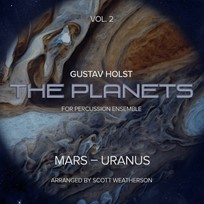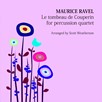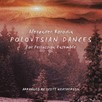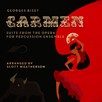
The Planets Vol. 2 (Mars - Uranus)
Composer: Gustav Holst
Instrument: Percussion Ensemble
Level: Intermediate
Published: 2015
Price: €60.00
Item details
-
Description +
-
Gustav Holst's monumental orchestral suite 'The Planets' (1914-1916) is a dense palette of swirling colours. Each movement is a miniature tone poem characterizing the astrological nature of all the planets in the Solar System, except for Earth. Interestingly, the work was originally written for 2 pianos – the percussive nature of piano writing transfers easily to percussion instruments themselves. However it is from the orchestral score that this arrangement draws its inspiration.
This arrangement, spread across two volumes, features the movements Mars, Mercury, Jupiter and Uranus. I have tried to capture the way Holst moves the instrumental colours throughout the full orchestra in order to create a 'percussion orchestra'. Some suggestions for mallet choice are given, such as using the shafts of the sticks at the beginning of Mars to mimic the 'col legno' sound of the strings, or a different mallet choice for glockenspiel in Mercury to create a sound more like the celesta, but generally the choices are left up to the players.
The arrangement is scored for 10 players and requires an instrumentation of 2 glockenspiels, 2 xylophones, 2 vibraphones, 3 marimbas (including one 5 octave instrument), chimes, a crotale in E, and 5 timpani. All of the parts use only 2 mallet playing and some shifting between instruments is required; the chimes should be placed next to one of the xylophones and the single crotale is played by the timpanist. The timpani part is an amalgamation of the original 2 orchestral parts, condensed and in some places altered to enable it to fit onto 5 timpani, as well as extra entrances added to suit the ensemble writing.
-
-
Instrumentation +
-
Percussion Ensemble (number of players: 10)
Glockenspiel (2)
Xylophone (2)
Vibraphone (2)
Marimba (3) (including one 5 octave instrument)
Chimes (1)
Crotale (E)
Timpani (5)
-
-
Watch+
-
About the composer +
-
Gustav Theodore Holst (born Gustavus Theodore von Holst; 21 September 1874 – 25 May 1934) was an English composer, arranger and teacher. Best known for his orchestral suite The Planets, he composed a large number of other works across a range of genres, although none achieved comparable success. His distinctive compositional style was the product of many influences, Richard Wagner and Richard Strauss being most crucial early in his development. The subsequent inspiration of the English folksong revival of the early 20th century, and the example of such rising modern composers as Maurice Ravel, led Holst to develop and refine an individual style.
There were professional musicians in the previous three generations of Holst's family, and it was clear from his early years that he would follow the same calling. He hoped to become a pianist, but was prevented by neuritis in his right arm. Despite his father's reservations, he pursued a career as a composer, studying at the Royal College of Music under Charles Villiers Stanford. Unable to support himself by his compositions, he played the trombone professionally and later became a teacher—a great one, according to his colleague Ralph Vaughan Williams. Among other teaching activities he built up a strong tradition of performance at Morley College, where he served as musical director from 1907 until 1924, and pioneered music education for women at St Paul's Girls' School, where he taught from 1905 until his death in 1934, raising standards and so laying the foundation for several professional musicians. He was the founder of a series of Whitsun music festivals, which ran from 1916 for the remainder of his life. Holst's works were played frequently in the early years of the 20th century, but it was not until the international success of The Planets in the years immediately after the First World War that he became a well-known figure. A shy man, he did not welcome this fame, and preferred to be left in peace to compose and teach.
In his later years his uncompromising, personal style of composition struck many music lovers as too austere, and his brief popularity declined. Nevertheless, he was a significant influence on a number of younger English composers, including Edmund Rubbra, Michael Tippett and Benjamin Britten. Apart from The Planets and a handful of other works, his music was generally neglected until the 1980s, since when recordings of much of his output have been available.
-
-
Reviews +
-
Review (Percussive Notes, July 2016)
Originally scored for two pianos, most familiar in its symphony orchestra arrangement, and here written for keyboard percussion ensemble plus timpani, the movements from Holst’s “The Planets” are widely recognized for their majestic nature and stylistic diversity. Scott Weatherson includes two movements, “Mars” and “Uranus,” in this collection, each scored for nine keyboard percussionists plus one timpanist using five drums. Somewhat surprisingly, none of the original non-pitched percussion instruments are included in this arrangement, although given its consistency with the original orchestration, those parts could theoretically be incorporated without much difficulty.
While none of the individual parts look particularly intimidating, given the familiarity and majesty of the orchestral arrangement, only an ambitious ensemble would take on the challenge of presenting this work, and a concerted effort will be required to fully realize all of the scored nuances and create an effective performance.
—Josh Gottry
-
-
Credits +
-
Front Cover Graphics and Layout: Gaia Gomes
Engraving: Scott Weatherson & CPH Engraving
Printed in Copenhagen, Denmark
Copyright © Edition Svitzer
www.editionsvitzer.com
-




